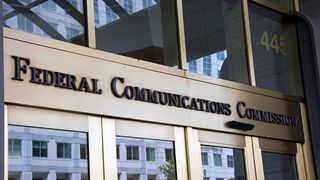Still No FCC Decision on Nexstar-Media General

In the "no news is not good news for either Nexstar or Media General" department, the FCC's Media Bureau has yet to act on the waiver request by the two broadcasters that the commission make a decision on their proposed $4.6 billion merger.
An FCC source confirmed that status, and the FCC's informal shot clock on the deal—it shoots for 180 days—was at day 306 at press time. As the days wind down to the holidays, it looks unlikely the waiver will be ruled on before the end of the year.
Related: ACA to FCC: Deny Nexstar-Media General Waiver
The companies extended some deadlines for the deal completion a couple of weeks ago amidst buzz that the FCC might be ready to both rule on the waiver and decide on the deal, which could come simultaneously. But that did not materialize.
The FCC signaled early on that it would not make decisions on station license transfers that could implicate spectrum auction participants—this deal qualifies—while the auction was still going on.
The FCC is shutting down bidding in the auction starting Dec. 23 and won't resume until the new year.
Optimistic predictions had been that the auction might be over in the fourth quarter, or even third, of 2016, but it is now in stage four and won't finish up until at least late January or early February and potentially longer.
Broadcasting & Cable Newsletter
The smarter way to stay on top of broadcasting and cable industry. Sign up below
The Justice Department gave the deal a clean bill of health from the antitrust standpoint back in September, requiring it to sell WBAY Green Bay to Gray Television; WSLS Roanoke-Lynchburg to Graham Holdings; KADN and KLAF-LD Lafayette to Bayou City Broadcasting; WTHI Terre Haute to USA Television MidAmerica Holdings; WFFT Fort Wayne to USA Television; and KWQC Quad Cities to Gray.
The FCC conducts a public interest review that goes beyond mere antitrust, but the FCC and Justice usually coordinate their reviews of deals, so the FCC approval should come at the same time if the FCC decides to grant the waiver request.
One reason for delaying the waiver decision could be if the commission plans to put any conditions on the deal related to so-called "after acquired clauses." The clauses would allow Nexstar to apply its retrans agreement to stations it acquires in markets where it already has a retrans deal with that MVPD.
The American Cable Association has asked the FCC to condition the deal on not allowing those clauses to trigger,
Back in October, members of the Congressional Black Caucus called on the FCC to grant the waiver. That is because the deal includes the spin-offs of Fox and NBC affiliates to Bayou City, which they said was the only African-American broadcaster in the country owning, operating and managing "every aspect" of its TV stations.
"It is a regulatory travesty that Chairman [Tom] Wheeler has not moved to close out a patently non-controversial merger such as Nexstar - Media General, especially after the Justice Department completed its review before Labor Day," said Adonis Hoffman, CEO of Business in the Public Interest and former chief of staff and senior legal advisor to FCC commissioner Mignon Clyburn and a backer of the deal.
"Apparently, the 180 day shot clock has no integrity. Relative to more complicated deals like Charter and AT&T which took over 300 days, this transaction is remarkably simple—involving a few broadcast licenses. Now that the auction is waning, Chairman Wheeler should close out the ledger on this deal so it can help his 2016 won-loss record."
"And on a broader note, the Chairman should take solace in his good work on public safety and security, which has been a notable high point of his tenure."
"[T]he applicants sought approval of their deal knowing that the Commission’s rules explicitly prevent, for good reason, approval of such acquisitions until after the incentive auction is completed," said ross Lieberman of ACA. "We’re in stage four of an auction that the FCC anticipated could last at least nine stages. Plainly said, there’s nothing unusual in that the auction is ongoing, and no travesty in that the Nexstar deal remains pending."
Media General indicated its participation in the auction—it was allowed by the FCC to signal, and did signal, that it was applying to be eligible. In setting up the auction, the FCC decided not to act on transfers involving such stations on the theory that that could provide information from which bididng strategies might be gleaned in violation of the FCC's rule against prohibited communications.
Contributing editor John Eggerton has been an editor and/or writer on media regulation, legislation and policy for over four decades, including covering the FCC, FTC, Congress, the major media trade associations, and the federal courts. In addition to Multichannel News and Broadcasting + Cable, his work has appeared in Radio World, TV Technology, TV Fax, This Week in Consumer Electronics, Variety and the Encyclopedia Britannica.

